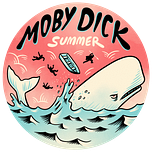It’s Friday and time for another Moby Dick MiniPod. This week we’re discussing Chapter 97 (“The Lamp”) with Sebastian Castillo, a writer and teacher who lives in Philadelphia. He’s the author of Not I and 49 Venezuelan Novels.
Other topics discussed in this episode: Tristram Shandy — Moby-Dick’s perfect and constant combination of violence, tragedy, absurdity, and comedy — As I Lay Dying — Chapter 64 (“Stubb’s Supper”) — the “Call me Ishmael” opening paragraph — Bartleby the Scrivener and Sebastian’s Twitter handle @bartlebytaco — Melville’s grave
In addition to Chapter 97, I do wish to briefly recap the other chapters in this week’s readings (Chapters 96-105). After the excitement that was last week’s chapters (Chapters 87-95), Ishmael seems to be back on his bullshit, nevermore so than in the opening lines of Chapter 102’s “A Bower in the Arsacides.” Ahem:
“Hitherto, in descriptively treating of the Sperm Whale, I have chiefly dwelt upon the marvels of his outer aspect; or separately and in detail upon some few interior structural features. But to a large and thorough sweeping comprehension of him, it behooves me now to unbutton him still further.”
Yes, after many, many chapters devoted to the whale’s outer body parts, Ishmael will now devote a few chapters to the inner parts, particularly, the skeleton. Though, admittedly, his awe in the presence of a sperm whale's skeleton and jaw in Pupella reminded me of my trip to the Nantucket Whaling Museum earlier this month.
I also did really like when Ishmael directly acknowledged why he’s been going on so much about whales. It’s part of the novel’s grand ambition, to center itself around the largest themes in life as well as the largest creature on earth. Or rather: “To produce a mighty book, you must choose a mighty theme. No great and enduring volume can ever be written on the flea, though many there be who have tried it.”
And I continue to enjoy the novel’s moments of absurdity, like the meeting between Ahab and the captain of the Samuel Enderby, a man who has lost his arm to Moby Dick much the same way that Ahab lost his leg. In lieu of shaking hands, these two Moby Dick victims cross their respective bone prosthetics. It’s absolutely ridiculous. As is Stubb’s monologue in Chapter 99 “The Doubloon,” which shows that his knowledge of the Zodiac could rival that of any astrology girlie.
But the most memorable chapter to me in this week’s readings was Chapter 105 (“Does the Whale’s Magnitude Diminish? – Will He Perish?”), in which Ishmael directly addresses the possibility that whales could be hunted to extinction, and that the industry he works in would be responsible for it. In this week’s podcast episode, Sebastian mentioned one of Moby-Dick’s central tensions: “What does it mean to transform the natural world into product? And capital?” And this question is deeply felt in Chapter 105. To some extent, the sadness of this chapter comes from the fact it hasn’t aged well. Elephants are critically endangered, they’re not as “numerous as droves of cattle in the temperate climes.” And whales can't hide under “the ultimate glassy barriers” of the North and South Poles when that ice is rapidly melting.
That’s about it, friends. Til next week. Also, I should mention that while I originally planned for Moby Dick Summer to run from Memorial Day to Labor Day, I forgot to factor in that Gmail truncates emails larger than 102 KB, which means I had to break up the novel into shorter excerpts than originally planned. So we still have a few more weeks of Moby Dick Summer. In fact, its conclusion will now more likely coincide with the actual last week of summer—September 19-23. But the end is nigh…
Speaking of the end, I shall leave you with the last stunning, foreboding sentence of Chapter 105. With its mention of a flooded world, this line seems to reach across time to convey the fury and suffering that whales—and many animals—experience due to climate change and overhunting, and the triumph they may feel should they outlive us humans.
In Noah’s flood he despised Noah’s Ark; and if ever the world is to be again flooded, like the Netherlands, to kill off its rats, then the eternal whale will still survive, and rearing upon the topmost crest of the equatorial flood, spout his frothed defiance to the skies.









